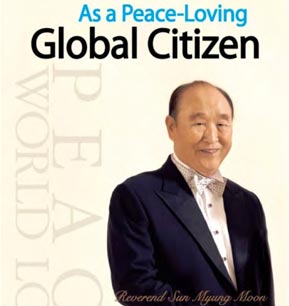ShareThis
Rev. Sun Myung Moon

As a Peace-loving Global Citizen is the autobiography of Rev. Sun Myung Moon, the founder of the Unification Movement. It was published in 2009 in both Korean and English by Gimm-Young Publishers of Seoul, South Korea. The book was released in South Korea on March 9, 2009 and debuted at #3 on the Businesss bestseller's list. It has ranked in various bestseller lists since then and was ranked 15th on the General bestseller's list as of October 14, 2009.
Talking about the Universe with the Insects
I did not spend all my time roaming the hills and meadows and playing. I also worked hard helping my older brother run the farm. On a farm there are many tasks that must be done during a particular season. The rice paddies and fields need to be plowed. Rice seedlings need to be transplanted, and weeds need to be pulled. When one is pulling weeds, the most difficult task is to weed a field of millet. After the seeds are planted, the furrows need to be weeded at least three times, and this is backbreaking work. When we were finished, we couldn’t straighten our backs for awhile. Sweet potatoes don’t taste very good if they are planted in clay. They need to be planted in a mixture of one-third clay and two-thirds sand if they are going to produce the best-tasting sweet potatoes. For corn, human excrement was the best fertilizer, so I would take my hands and break up all the solid excrement into small pieces. By helping out on the farm, I learned what was needed to make beans grow well, what kind of soil was best for soybeans, and what soil was best for red beans. I am a farmer’s farmer.
Pyong-an Province was among the first places in Korea to accept Christian culture, so farmland was already arranged in straight lines in the 1930s and 1940s. To transplant rice seedlings, we would take a pole with twelve equally spaced markings to indicate where the rows would go and lay it across the width of the paddy. Then two people would move along the pole, each planting six rows of seedlings. Later, when I came to the southern part of Korea, I saw that they would put a string across the paddy and have dozens of people splashing around in there. It seemed like a very inefficient way of doing it. I would spread my legs to twice the width of my shoulders so I could plant the seedlings more quickly. During the rice-planting season, I was able to earn enough money to at least cover my own tuition.
Pyong-an Province was among the first places in Korea to accept Christian culture, so farmland was already arranged in straight lines in the 1930s and 1940s. To transplant rice seedlings, we would take a pole with twelve equally spaced markings to indicate where the rows would go and lay it across the width of the paddy. Then two people would move along the pole, each planting six rows of seedlings. Later, when I came to the southern part of Korea, I saw that they would put a string across the paddy and have dozens of people splashing around in there. It seemed like a very inefficient way of doing it. I would spread my legs to twice the width of my shoulders so I could plant the seedlings more quickly. During the rice-planting season, I was able to earn enough money to at least cover my own tuition.
Tuesday, November 23, 2010
|
Labels:
Talking about the Universe with the Insects - part3
|
CONTENT
- FOREWORD
- CHAPTER ONE - Food is Love
- CHAPTER TWO - A River of Heart Flows with Tears
- CHAPTER THREE - The Man with the Fullest Stomach
- CHAPTER FOUR - Why We Work Globally
- CHAPTER FIVE - True Families Create True People
- CHAPTER SIX - Love Will Bring Unification
- CHAPTER SEVEN - Future of Korea, Future of the Wor...
- CHAPTER EIGHT - Message for Young People
